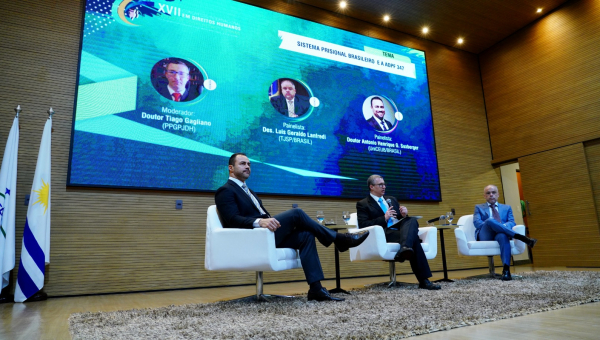
The Brazilian Prison System and the Argument for Failure to Comply with a Fundamental Precept (ADPF) 347 was the topic on the afternoon of the second day (October 3rd) of the XVII International Congress on Human Rights. The lecture featured Justice Luís Geraldo Lanfredi, from the Court of Justice of the State of São Paulo (TJSP), and Doctor Antônio Henrique Graciano Suxberger, coordinator of the Department for Monitoring and Inspection of the Prison System and Compliance with Socio-Educational Measures, to discuss the health of the Brazilian prison system, as well as the study of the application of fair sentences. The panel was mediated by Dr. Tiago Gagliano.
Addressing the situation of the prison system in Brazil and its institutional challenges, Lanfredi pointed to the difficulties within the prison system and recognized the State of Unconstitutional Things as the source of a problem that potentiates a weakness in public security. He said that non-compliance with basic socio-educational and humanitarian measures is a real scenario within prisons and must be rethought.
“The Brazilian prison issue reflects many problems and the disruption to our society; we must think about the execution of this system not only in legal terms, but connected to the reality of the economic and social inequalities that surround us,” said Justice Luís Geraldo.
The Justice recognized that the current conditions discourage and make the process of institutionalizing these citizens in prison meaningless, since they have been subjected to punitive measures that go beyond their basic rights, exposing prisoners to subhuman and undignified conditions.
“The Unconstitutional State of the Brazilian Prison System reflects the omission of the authorities in the face of the daily practice of a series of massive violations of the rights of incarcerated people who should be in a process of resocialization,” Lanfredi pointed out.
His speech also defended the need to consider rehabilitation as part of the process. The realization of these decisions evolves not only with the prison system itself, but also initiates a change in the cultural conception strongly present in society that dehumanizes the imprisoned person.
Afterwards, lecturer Antônio Henrique Graciano Suxberger highlighted the importance of recognizing the existing problems and the initiatives needed to change the prison system. According to him, “we need to recognize that the State of Unconstitutional Things, declared nine years ago by the Federal Supreme Court, was one of the most significant cases of a structural process in Brazilian justice”. This declaration, according to Suxberger, is a call for society to stop passively watching the tragedies that occur in prisons.
Suxberger also argued that, in order for the prison service to evolve, a commitment to human rights and democracy is essential. He argued that prison policy must be seen as a public policy, stressing that “there is no way to think of a prison justice system committed to human rights without guaranteeing the minimum standards of an equally committed penal policy”.
Finally, Suxberger stressed that it is not enough to criticize the system; it is necessary to offer alternatives to transform it. He emphasized the importance of a participatory role for the law, which goes beyond creating laws, putting pressure on the public authorities to fulfill their role.
“Being critical isn't about saying no to everything; it's about saying yes to what's different. We need to question the criteria that maintain the reality we question and give visibility to the problem that needs to be perceived and remedied,” concluded the lecturer, reinforcing the need for action to promote significant changes in the Brazilian prison system.
Tribute
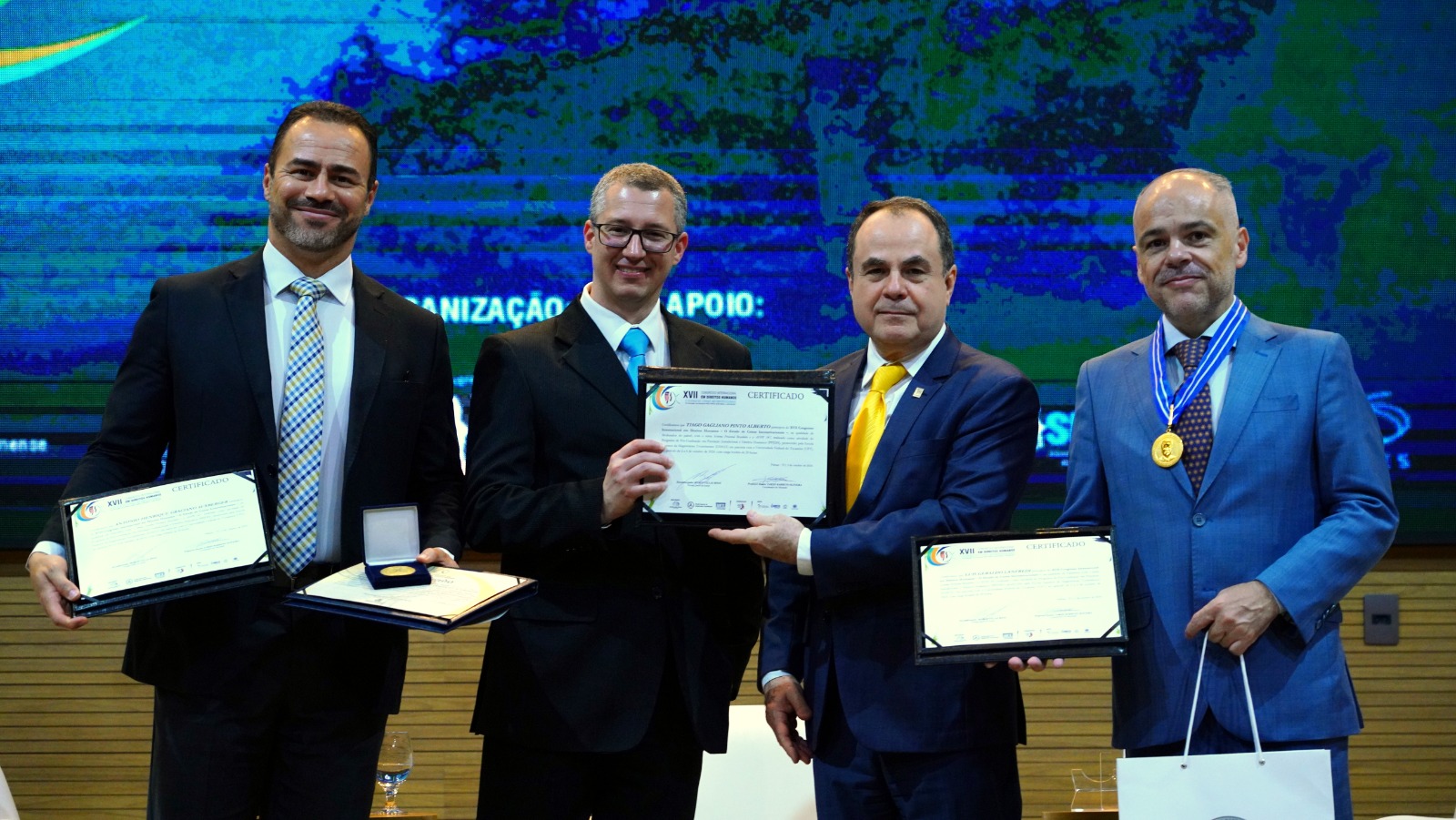 At the end of the presentations, the lecturers were honored in recognition of their contributions to improving the justice system. Justice Luís Geraldo Lanfredi received the “Antonio Rulli Junior” medal, commemorating 15 years of Esmat, awarded to those who have collaborated with the improvement of the Judiciary in the State of Tocantins and Brazil. The tribute was presented by Justice Marco Villas Boas, the General Director of the school. Doctor Antônio Henrique Graciano Suxberger was also awarded the ESMAT medallion, in recognition of his collaboration with the activities of the school and the strengthening of the judiciary in the State of Tocantins.
At the end of the presentations, the lecturers were honored in recognition of their contributions to improving the justice system. Justice Luís Geraldo Lanfredi received the “Antonio Rulli Junior” medal, commemorating 15 years of Esmat, awarded to those who have collaborated with the improvement of the Judiciary in the State of Tocantins and Brazil. The tribute was presented by Justice Marco Villas Boas, the General Director of the school. Doctor Antônio Henrique Graciano Suxberger was also awarded the ESMAT medallion, in recognition of his collaboration with the activities of the school and the strengthening of the judiciary in the State of Tocantins.




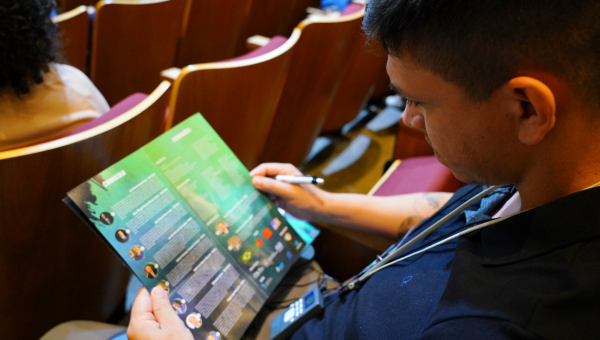
_thumbnail_thumbnail.jpeg)
_thumbnail_thumbnail.jpeg)
_thumbnail_thumbnail.jpeg)
_thumbnail_thumbnail.jpeg)
_thumbnail_thumbnail.jpeg)
_thumbnail_thumbnail.jpeg)
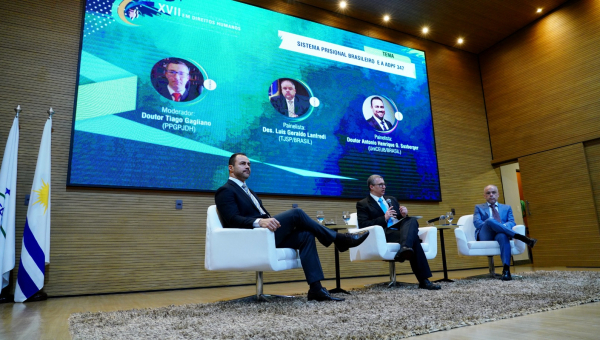
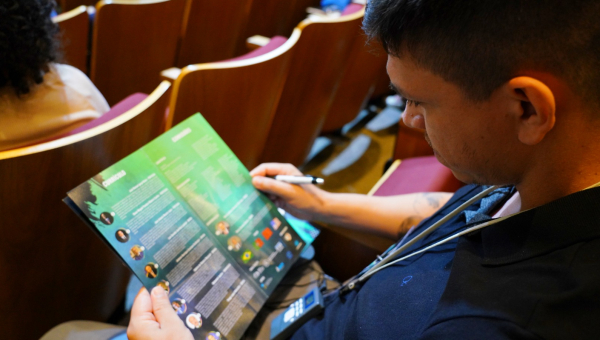
_thumbnail.jpeg)
_thumbnail.jpeg)
_thumbnail.jpeg)
_thumbnail.jpeg)
_thumbnail.jpeg)
_thumbnail.jpeg)
